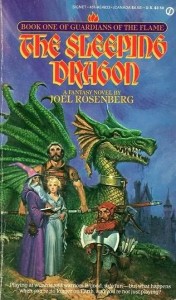 Last week fantasy author Joel Rosenberg died. Rosenberg’s Guardians of the Flame series was my introduction to fantasy fiction. In book one, real world college students become the characters they created when they are transported into their fantasy role playing game. Once inside the game world they realize that in addition to possessing all of the powers and skills of their characters, they still also know everything they did in real life. These characters apply their modern beliefs and values along with rudimentary technology into the game world and become a powerful force striving to make an imperfect world better. As an avid gamer I thought this was the most brilliant premise I’d ever heard the first time I read these books.
Last week fantasy author Joel Rosenberg died. Rosenberg’s Guardians of the Flame series was my introduction to fantasy fiction. In book one, real world college students become the characters they created when they are transported into their fantasy role playing game. Once inside the game world they realize that in addition to possessing all of the powers and skills of their characters, they still also know everything they did in real life. These characters apply their modern beliefs and values along with rudimentary technology into the game world and become a powerful force striving to make an imperfect world better. As an avid gamer I thought this was the most brilliant premise I’d ever heard the first time I read these books.
The series capped at 10 books, but for many fans the essence of what made this series great ended with book five. Books six through 10 saw the real world character retire (or die) and their children become the focus of the adventures. I’ve read those first five books many times. And even though I’ve read hundreds of other fantasy novels since then I still think that the initial premise of the series holds up. I mean, really, who among us hasn’t imagined themselves as their character at one time or another?
One of the things that I enjoyed (and I guess still enjoy) about these books is that the line between player and character is erased. The players actually become the characters. They know whatever it was they studied at college as well as the magic or swordplay that their character excelled at. Add to that their knowledge of pop culture and these character are arguably more interesting than any found in the Forgotten Realms.
Inspired by The Guardians of the Flame, I’ve played in a couple of games over the years where we’ve used this plot device. We’ve actually made PCs based on ourselves. And you know what? It was a lot of fun. So let’s see how we might accomplish this undertaking using 4e D&D mechanics.
Character Creation – Method 1
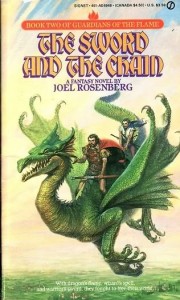 When we undertook this exercise in previous editions of D&D we always began by stating ourselves. This usually doesn’t take very long since we don’t have many special powers relevant to D&D. For the most part our ability scores tend to fall between 8-10 across the board. Since most of my gaming friends have no weapon skills to speak of that means combat stats are nonexistent.
When we undertook this exercise in previous editions of D&D we always began by stating ourselves. This usually doesn’t take very long since we don’t have many special powers relevant to D&D. For the most part our ability scores tend to fall between 8-10 across the board. Since most of my gaming friends have no weapon skills to speak of that means combat stats are nonexistent.
In order to best capture “you” in your character I strongly recommend that character creation happen collectively. Bring the entire gaming group together when creating your characters, both real world and fantasy world versions. By making it a group activity you can collectively decide on everybody’s abilities by comparing them to one another. For example, if my starting Constitution is 10 (average) and I work out 5 times a week, then I could argue that my friend, who’s in pretty good health but doesn’t exercise at all, might have a slightly lower starting Con, maybe 8-9. You get the idea.
After determining ability scores figure out what skills you possess. Since most of my peers are highly educated (all of us having at least one college or university degree) we realize that our lack of combat prowess is made up for with extensive training in multiple areas (more than most classes allow).
With our real life selves documented on a character sheet we figure out how best to transform ourselves into actual D&D characters. Playing ourselves as ourselves would be boring. Our lack of combat abilities and magical power means that the first encounter we faced would end up with us being taken prisoner or being eaten by monsters – no one’s idea of a good time. So instead we apply some character creation magic.
Begin with fantasy races. Just because we’re all Human in real life doesn’t mean that we’re all going to remain Human in the game world. Try to go with something that makes sense for the fantasy version of you that you envision. If you’re a big guy in real life perhaps you’re a Goliath or Minotaur in the game. Or maybe you feel that your gruff nature makes you more suitable to being a Dwarf. Perhaps your affinity for nature and aversion to meat mean you feel more akin to the fey races like Elves or Gnomes. Discus options as a group, just like you did for ability scores, and let the table weigh in before nailing down your character’s race.
To create actual playable D&D characters you now have to pump up your abilities (applying appropriate racial modifiers if you opted to be something other than Human). The DM determines how many points to apply and using the point-buy system assign scores using your real life stats as the baseline. Where possible, we look at which abilities scores are already exceptional in our real life stats and build on those.
For example, one of our players is a pharmacist with three university degrees. He owns and operates his own drug store, employing over 30 people. In real life Intelligence is absolutely his highest ability score, but his Charisma is a close second. So when he adds his points he should begin by pumping up these two abilities to exceptional levels based on D&D rules.
Next we look at class. There are two reasonable ways to decide on class selection. Either look at the class that you think most closely matches your real life vocation or look at classes that work best with your highest abilities. So our pharmacist friend could be a Druid or Assassin (based on his extensive knowledge of plants and medicines), or he could be a Wizard because of his high Intelligence. You could also argue that his role as a healer and a leader makes him a perfect Cleric.
With a solid foundationin place it’s time to complete your character. Finish the character as you would any other, by choosing powers and gear as appropriate for your class and level. This kind of game really works well if you begin above level 1. In the novels, the heroes just appear out of nowhere and are already pretty tough. This makes a lot of people take notice and puts them in the centre of the action. If they’d only been level 1 then they wouldn’t have had the power necessary to be as influential or troublesome to the establishment.
Character Creation – Method 2
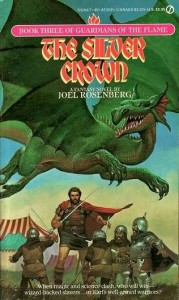 A much easier way to play this kind of campaign is to run it just like they did in The Guardians of the Flame series. Everyone makes whatever character they want using the normal character creation rules. Then you tweak it, adding what the player knows and can do to the already completed PC. This may involve a bump to Intelligence, Wisdom and Charisma as well as adding extra feats and trained skill.
A much easier way to play this kind of campaign is to run it just like they did in The Guardians of the Flame series. Everyone makes whatever character they want using the normal character creation rules. Then you tweak it, adding what the player knows and can do to the already completed PC. This may involve a bump to Intelligence, Wisdom and Charisma as well as adding extra feats and trained skill.
The danger to taking this approach is that some players will get greedy and make physically powerful character with low mental scores. They’ll essentially get to overwrite the PCs low Intelligence with their own (player’s) higher Intelligence.
If you opt to play this kind of campaign and take this second character creation method then I wouldn’t let the players in on the reveal until all of the characters are complete. This way everyone makes the character they actually want to play with no extra motivation or agenda to get more out of it by playing one kind of character over another.
The Campaign
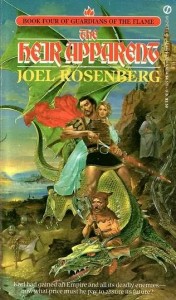 Running this kind of game can be a lot of fun… at first. There needs to be a good reason that the players from the real world have become the PCs they created. In The Sleeping Dragon, the first book in The Guardians of the Flame, the heroes are looking for the gateway between worlds so that they can get home. Needless to say things don’t go as expected. But thought the first novel they know that the bigger objective is to find the gateway and get through it.
Running this kind of game can be a lot of fun… at first. There needs to be a good reason that the players from the real world have become the PCs they created. In The Sleeping Dragon, the first book in The Guardians of the Flame, the heroes are looking for the gateway between worlds so that they can get home. Needless to say things don’t go as expected. But thought the first novel they know that the bigger objective is to find the gateway and get through it.
I suggest something like this to DMs because after a while, playing yourself in the game will become boring. A big part of why we play D&D in the first place is to escape our real lives and become a character. If the character is still you then what’s the point?
Another cautionary tale I will share with DMs is that if you’re going to try this gimmick, it has to include everyone. If only one or two players are playing themselves while the rest of the players are just running regular characters a lot of the chemistry and excitement disappears. The shared experience is the real thrill of playing this kind of adventure.
Have you ever played yourself as a D&D Character? How did you determine your ability scores, race, class and other statistics? How was the overall gaming experience with you as the character? Did you suffer a humiliating death or did you thrive and become a powerful PC in your campaign? If you’ve never tried playing yourself as a PC is it something you think you might be interested in trying?
As a writer I envision myself as a Gnome with the Mark of Scribing. Based on my many years in school, my love of reading and thirst for knowledge I envision myself as an arcane class – most likely a Bard, but possibly a Sorcerer. Assuming that I was thrust into the world of Eberron (where my regular home campaign takes place) then I also believe I’d be in some way associated with the Trust, the Gnomish secret police that have absolute power in Zilargo. But that’s just my initial concept. I’d have to see what the rest of my gaming group thought of this idea when compared to how they see themselves as D&D Characters.
The Books
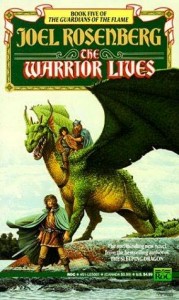 If you haven’t read The Guardians of the Flame I strongly recommend that you find copies of these novels and get reading. You’ll be glad you did. Print copies may be tough to find anywhere but your local used books store or on eBay. You will likely have an easier time finding an ebook copy online.
If you haven’t read The Guardians of the Flame I strongly recommend that you find copies of these novels and get reading. You’ll be glad you did. Print copies may be tough to find anywhere but your local used books store or on eBay. You will likely have an easier time finding an ebook copy online.
- The Sleeping Dragon: 10 on a d10
- The Sword and the Chain: 9 on a d10
- The Silver Crown: 8 on a d10
- The Heir Apparent: 10 on a d10
- The Warrior Lives: 8 on a d10
R.I.P. Joel Rosenberg, May 1, 1954 – June 2, 2011.
 Looking for instant updates? Subscribe to the Dungeon’s Master feed!
Looking for instant updates? Subscribe to the Dungeon’s Master feed!
8 replies on “Playing Yourself as a D&D Character”
You can buy the books as non-DRMed ebooks on Baen’s site. The first three books are $5 and you can read sample chapters here http://www.webscription.net/chapters/0743435893/0743435893.htm?blurb
I loved that series, but I stopped at book 6 as well. Without Karl, the series didn’t hold the same magic. Thanks for the throwback. The first 3 for sure are the best ones.
I will have to check the series out. Hopefully I can find it at the library, at the moment, free is good.
I think I’ve only read the first 3. I didn’t know there were more than that until today!
If you find it fun to come up with RPG stats for yourself, I’d suggest giving it a go with GURPS. That game has rules for almost everything, so you can model a real person pretty accurately. Although it’s pretty funny to see how many character points certain things are worth. According to the standard skill rules, one of my friends spent the vast majority of his points on typing!
On many occasions I have agonized over how best to create myself (and others) in DnD. Stats and class are tough choices. In day to day life, most people don’t think of themselves as “heroic champions”… so does that mean fewer points for the point-buy system? Does one need to be a world-class Olympic athlete to justifiably have an 18+ con/dex/str?
From what you have here, I think method one seems to be the most sound.
I have read and re-read these books and hearing the Rosenberg died was a real bummer. What really struck me about the books were the harsh consequences of the character’s actions. Whatever their motivations they paid a price for their decisions and it was almost never trivial.
[SPOILER] Karl dying was the natural continuation of that concept and while the series wasn’t as interesting after he died, it rang true as a bell to the theme.
~S.M.
I have taken a test to determine what my stats would be. The results were kind of high. i answered truthfully. i was a lvl 3 druid/ranger and stats str 19 dex 18 con 16 con 17 int and wis 15 cha. I have done the research and came up with 16 for str,dex, and wis. a 14 for con and int and cha. I am in military and have a ba in sociology. i feel the latter come real close. I was a 10 a long time ago when i was in my teens.
@ sunyaku 18 can be earned if you have the genes or work out for str and end.
Give the last three books a try, they are very good. It’s only the ones staring Jason Cullinane that are awful. Not Exactly the Three Musketeers, Not Really the Prisoner of Zenda, Not Quite Scaramouche are all good reads, with little interference from Jason as they focus on three new characters. Jason was weak and indecisive, which may have been realistic, but doesn’t make for a good fantasy novel. Books 7-10 are about totally different characters: Pirojil, Kethol, and Durine, and they are well work reading. *I hesitated for a long time after Karl’s death left a really bad taste in my mouth, but I’m glad I took the chance on these, they’re now my favorites in the series.* R.I.P. Joel Rosenberg (1954-2011)